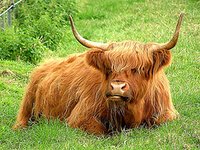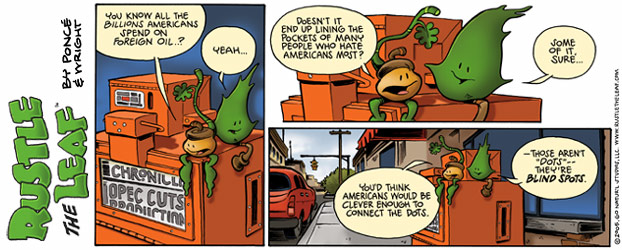WEEKLY Q: Why do we eat meat?
 Time for the weekly question.
Time for the weekly question.Why do we eat meat?
Generally if you ask this question you get back a range of answers including:
- Why not?
- Meat tastes so good.
- It's good for you.
- We deserve dominion over what are essentially dumb and numb animals.
- What else are animals for?
And before I start I promise this is not about bashing meat eaters. So all veggies out there please be nice. After all I was a meat eater until very recently. I just want us to collectively explore the issue without offending or being offended ok so lets have a mature and reasoned debate.
My answer:
We eat meat because society and industry maintains a positive but false set of messages about a supposed need for meat when really we do not nutritionally need it, it causes suffering to animals and is environmentally unsustainable.
Meat is environmentally unsustainable
Around 4 kilos of grain are required to produce 1 kilo of pork, and 8 kilos are needed for a kilo of beef. (Source: American Association for the Advancement of Science). So we could feed more people with the grain used to produce meat than the meat itself. Would you put your money in a bank account if it had a negative interest rate? I think not.
Vegans and Vegetarians live long lives too
The argument that we need meat for protein does not hold water. The founder of Veganism died only recently and provided a living testament to this point
DONALD WATSON survived to the age of 95; good propaganda in his campaign to convince the world that there is nothing inherently lethal about a vegan diet. He always regarded himself as a propagandist, in the term’s non-pejorative sense. When interviewed at 92 he was pleased to report that he had lived thus far without resort to medication “either orthodox or fringe”, and with hardly a day’s illness.Meat means death
No matter how we dress it up in order to eat meat an animal died. And that tends to involve pain. Oh sure we might reduce the pain and comfort the animal (although if you watch Earthlings clearly we do no such thing) but surely a bird in a gilded cage is still a bird in a cage. Animals clearly do feel pain. Maybe it is different pain but hardly fair of humans to discount that pain because it is different to ours. Which I am not convinced it is.
Look forward to your thoughts.
Namaste
Al
Technorati tags:
cityhippy
green
environment
sustainable
alternatives
lifestyle
meat
vegetarian
food

































14 Comments:
Al,
There are a few things to unpack there.
First, we all have to live on things which were once alive. I do not care for the accusation that because I live on one kind of lifeform, I am morally corrupt compared to those who live on another.
Second, it is not automatically environmentally unsustainable. Most of the great wild areas (of the UK and beyond) are created by thousands of years of grazing. If you stop, you lose the great landscapes of the Lake District, Dartmoor and so on. Indeed, some of the rarest habits in the UK are directly cause by sheep cultivation (limestone grassland). Yes, I'd agree that overfarming is damaging, but not animal farming per say.
Well there are a few thoughts to be going on with.
Joe
Al,
I agree with what you say about meat if you're referring to industrial meat production, and it's actually far worse than that.
HOWEVER, when you're talking about grass fed beef, free range chickens, etc, from small farms where they're allowed to act as they would normally and be happy... I don't see a problem with eating them.
No, meat isn't necessary NOW, but in most cases in human history, we needed it to survive. You can now make the choice to be a vegetarian or vegan, but only because we have a worldwide food system that allows us to get lots of nutritious foods from different places at any time of the year. If that wasn't true, it would be MUCH harder to live without meat in alot of the world.
I'd just like agree with the previous two comments. I eat meat, and as such see no problem with that, so long as the animals suffer as little as possible (e.g. no industrial production).
I also feel that as much of the animal as possible should be used, so animals are not killed for no reason.
Like it or not the Britian of today is a product of farming, animals being part of the process.
I think it comes down to personal preferance and treating you food, animal or vegtable, with respect.
I knew this would be controversial but thanks for all your comments. Please do not take what I am saying as judgemental as it is not the purpose of this post. The purpose is to just discuss the issues.
Hey Joe
Surely you see a difference between a banana and a chicken? ;)
I hear what you are saying in your second point but allowing animals to graze and eating animals are surely two different things?
Hey George
You make a great point about meat being an efficient food for those without access to other options but in our modern developed society we have plenty of other options. Plus wasn't meat traditionally a sign of wealth and not a staple of those in the greatest need?
Hey Mongoosefred
I appreciate your clarity and honesty. Minimal pain and a high quality of life are certainly what should be the societally acceptable norm. Perhaps people are driving supermarkets in that direction anyway? Also I like the 'use the entire animal' argument - that is what some tribal cultures tended to do as it is a sign of respect of the animal. To kill only what is needed and to use the entire animal.
And using the word respect as your last word is indicative of the right kind of attitude that should emanate from all of us when it comes to food.
Reconnecting with our food is a good goal.
Namaste to you all
Al
Hey Joe
Surely you see a difference between a banana and a chicken? ;)
I hear what you are saying in your second point but allowing animals to graze and eating animals are surely two different things?
A banana is a bad choice as it is a fruit - the plant survives whether or not you eat the banana. But if you are asking whether I see a different between eating a chicken and a plant/bacterium/yeast then the answer is no.
And no, not really, grazing needs human management to be effective. Domesticated animals wouldn't survive long outside of any human interaction - so the choice is whether to allow the animal to have a reasonable life and then eat it or to not have a life at all.
I do, however, have a problem with factory farming in general and aboitoirs in particular. In consequence, we reduced our meat intake by 90%, bought only certified meat and game. The question is whether I'd be able to kill my own food and if not, why I expect others to do it for me.
Too subjective a topic I guess which is fair enough :)
Personally I do see a difference defined by demonstrable evidence of pain in a chicken whereas a plant/bacterium/yeast has no known pain mechanism or sensory mechanism similar to pain. Then again I am only an amateur biologist ;)
When you say grazing needs human management to be effective, who is it effective for? The planet or people? How did the world survive before humanity domesticated cattle?
I once read a great book about why we domesticate animals called: Rogue Primate: Exploration of Human Domestication.
Am sure you would find it stimulating...
Namaste Joe
Al
I became a vegetarian about four years ago. I had already severely limited my intake of meat products -- no beef or pork, occassional chicken and fish -- but the argument that finally won me over completely was the difference it made in my overall ecological footprint (http://www.myfootprint.org/). Removing all meat nearly cut it in half.
I think there is a general impression that vegetarians are both preachy and obnoxious, same with environmentalists. Due to the well-meaning but ultimately harmful actions of a few antagonistic and/or self-righteous folks, it is very difficult to convince people that you are truly looking for a dialog. If someone suspects you have an "agenda" (i.e. to make the entire world stop eating meat) any discussion is pretty much over at that point. It either starts out or breaks down in defensiveness, anger or hurt feelings.
I think this is in part because people recognize on some level that they are part of a flawed system. They also aren't sure how to extricate themselves from it or even if they want to, which would mean an end to life as they know it and no more modern conveniences or daily enjoyments. It all feels rather overwhelming to make the kinds of changes that would be necessary to truly affect the world. Too much big picture thinking and not enogh focus on the baby steps it takes to get there. Thus, raising topics such as this are difficult at best. It doesn't mean we shouldn't, it just means it is tough to make any progress.
For me, I started out by cutting out beef. I rarely ate pork, so that was next to go. Then chicken and ultimately fish. After a short time, I started experimenting with soy-based alternatives to dairy and while I doubt I will ever be a full-fledged vegan, I eat eggs maybe twice a year and a couple of times per week indulge in a little goat cheese. All of these changes seem like a pretty drastic reduction looking back on my life nearly a decade ago, but making them one at a time was actually quite simple.
Rather than introducing such a blunt and dramatic shift such as let's not eat meat, it sometimes works best to start from a point of reference that is familiar. Like, where does our food come from? How was it produced? How does the agrobusiness model contribute to our dependance on oil? What are the sanitary conditions in factory farms like? What kinds of risks does this pose for the general public? Is this the most efficient process? Do we need to eat so much meat? Etc.
I have found that arguments which come from a humane treatment perspective are generally not well received. Health and environment are tolerated much better. Lately I've been reading The Omnivore's Dilemma, which highlights many of the reasons why our current agrobusiness model is not only impractical but actually quite disgusting and at odds with the natural order. Lots of good fodder for discussion in there.
I think that having a greater connection to our food and where it comes from is key. I also think it is important to respect people's decisions.
Namaste Rachel
I am so down with what you have said. Probably the best comment so far since we launched. Superb.
I hope everyone realises that I do respect their decisions...but that I just wanted to raise the issue. And that is impossible to do without taking a position of course.
Namaste Rachel
Al
In a lot of cases, I'd say it's purely the status quo. People are just used to it, don't think about it and as such aren't aware of any alternatives. It's as much habit as anything else. Only when something comes along to make you question the habit do you realise there might be associated problems and other, possibly better choices.
I've been veggie for three years, and the catalyst was a TV documentary about the factory farming of chickens, the health and welfare of the birds and general nastiness of the process as a whole. That changed the way I viewed food virtually overnight, and raised questions such as "is it really fair for a chicken to have zero quality of life crammed in a glorified warehouse just so I can have a cheap curry?". The answer, I concluded, was no. I decided I wanted no part in the process, so I gave up meat. I think that was the catalyst for my increased interest in environmental issues, as the realisation that my choice of diet impacted other areas made me question what other aspects of my life at the time also had wider implications.
[i]Personally I do see a difference defined by demonstrable evidence of pain in a chicken whereas a plant/bacterium/yeast has no known pain mechanism or sensory mechanism similar to pain. Then again I am only an amateur biologist ;)
When you say grazing needs human management to be effective, who is it effective for? The planet or people? How did the world survive before humanity domesticated cattle? [/i]
For what it is worth, I studied habitat management at degree level.
Many of our rarest habitats (with the rarest plants and animals) are those which have been managed for thousands of years for animal production.
We are part of the system - if you suddenly change what you have been doing for tens of thousands of years, then the balance changes. Hence all the troubles caused by the changes in agriculture within the last 50 years.
Also you might be interested to know that there is research in plants into some kind of co-ordinated hormonal system - which of course is some way from saying that plants feel pain, but then... who knows?
And for the record, although I hear what is being said about intensive agriculture, the footprint calculations are flawed for various reasons. For example, some species of cattle can live in areas where no plant production would be achieved. Also eating a plant from your allotment is vastly different from eating a vegetarian ready meal using grain from Argentina.
sorry I bodged up the tags in that last one :o
Hey Joe (good name for a song eh)
Habitat management eh?
This is a murky area but for me it comes back to a couple of key uncontested points:
1) Meat just isn't environmentally sustainable or required for a healthy lifestyle.
2) Eating meat is a choice and not a need.
On that basis I have chosen not to eat meat and fish. Other people make their own choices and that is that. Fair play to them.
Incidentally I actually do believe that plants feel...but we have to eat something (or do we? hahaha) and personally I am just unable to eat anything with a face ;) Death to all Bananas! Hahahaha
Namaste
Al
Hiya mate,
I eat meat because I feel very weak if I don't. Fate has dealt me a cruel hand and made me allergic to some major sources of protein such as milk, nuts, eggs, fish, beans and lentils.
Ideally, I would get by on chick peas, tofu, quinoa and perhaps some other stuff. However, it just doesn't work. I become so feeble and I can't keep up the pace of life. I get ill.
I was veggie for nearly ten years before I realised I was totally malnourished. Once I tried going vegan. Looking back, I think I was lucky to survive that episode.
I'd still like to be a veggie again. I perfer organic or free range meat, though sometimes you will catch me in some fast food joint grabbing a burger because I've been neglecting my carnivorous duties and suddenly start feeling like I'm going to keel over.
Protein deficiency is not nice. I suppose if I was truly committed to veggy-ism, I would just tolerate being weak. But I'm not even convinced that eating meat is definitely wrong. Generally, I agree with the argument that if you give an animal a nice life, then so what if you eat it afterwards?
Having said that, I would like to see an entirely veggie world as part of a world without any killing whatsoever, on the basis that to take away another being's life is bound to be bad karma in some way or another.
Finally, on the subject of pain, here is a quote from a novel by my favourite fiction writer, Iain M. Banks:
"...the ability to suffer was what ultimately marked out sentient life from any other sort. They didn't mean just the ability to feel physical pain, they meant real suffering, they meant the sort of suffering that was all the worse because the creature undergoing the experience could appreciate it fully, could think back to when it had not suffered so, look forward to when it might stop (or despair of it ever stopping - despair was a large component of this) and know that if things had been different it might not be suffering now. Brains required, see? Imagination. Any brainless thing with a rudimentary nervous system could feel pain. Suffering took intelligence."
I liked the reasons you provided. But here are a few of ours for your reading.
http://www.cafepress.com/antivegetarian
Post a Comment
<< Home